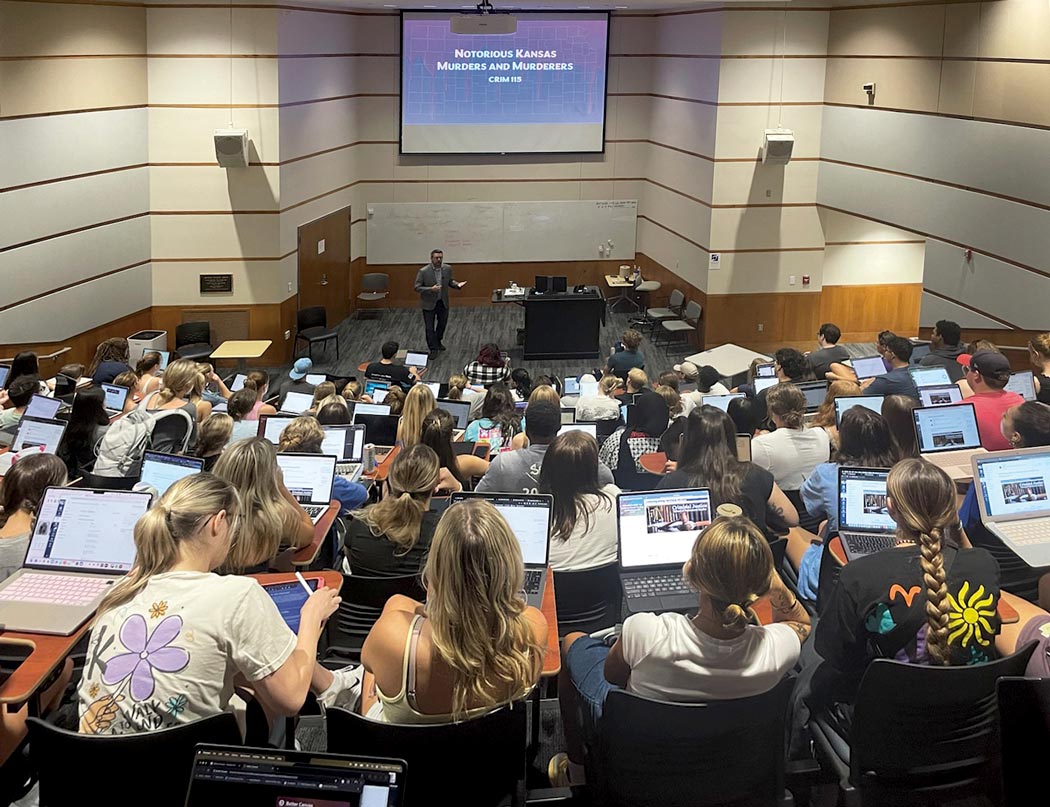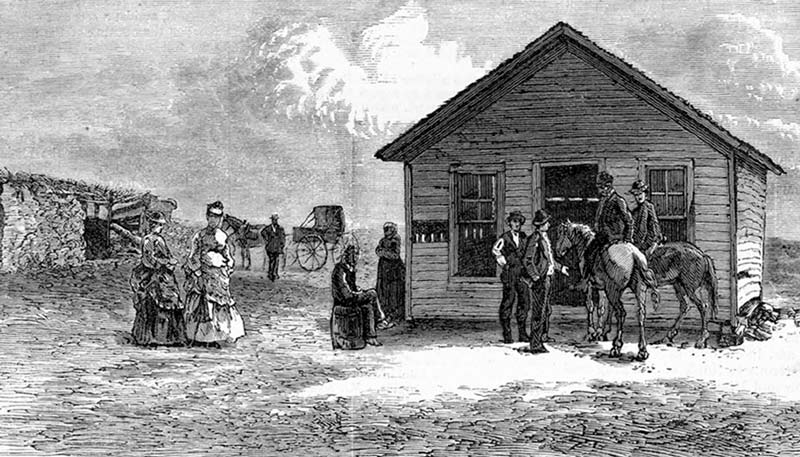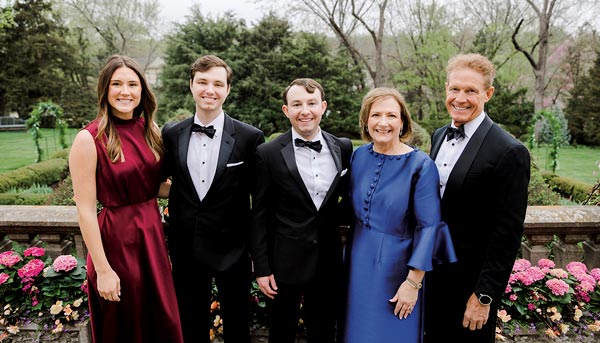KU launches criminal justice degrees
The University’s new program answers growing demand for major, prioritizes career placement.

Pop culture can color public perception of a profession by portraying it as dynamic or dull, prestigious or ordinary. For her purposes as director of KU’s new criminal justice program, Susan Whitford welcomes the high-drama TV depictions of her discipline as a valuable recruitment tool.
“Shows like ‘CSI,’ ‘Criminal Minds’ and ‘Law & Order’ introduce so many people to jobs in criminal justice and pique their interest, even though they know it’s dramatized,” says Whitford, who worked as a crime analyst for more than 30 years before joining KU in July 2023 to develop its two new degree offerings, a Bachelor of Arts and Bachelor of Science in criminal justice. “They can see this type of work is exciting and always changing. TV gets people in the door.”
Once they’re in the door, Whitford thinks curious students will find a compelling, wide-ranging field that also dovetails with several other areas of study—law, social welfare, behavioral health, life sciences and more—and the program she has designed features a core curriculum taught entirely by instructors whose expertise is rooted in real-world experience.
“Something that’s really unique to our program is that all criminal justice professors are professors of the practice, meaning they’ve all worked in law enforcement, victim advocacy, crime analysis or other sectors of the criminal justice world,” Whitford says. “That’s really important in a criminal justice degree for credibility with students. They don’t want to hear from people who have never done these jobs, and I only have faculty teach in a subject they’ve worked in.”
KU’s criminal justice program, part of the School of Professional Studies, has three full-time faculty members: Whitford; Stephen Bell, a 22-year veteran of law enforcement and former detective and sergeant with the Los Angeles Police Department; and Misty Campbell, who previously worked with victims of violent crime and in violence prevention and response. Several lecturers—a group comprising police officers, forensic scientists, attorneys and others who work in associated careers—also teach criminal justice courses.
Undergraduate degrees in criminal justice equip students with an understanding of the agencies and institutions within the U.S. criminal justice system and how they function. The curriculum explores law enforcement, courts and corrections and the various specialties within each. Whitford says professional paths for criminal justice majors can include roles with government agencies and careers in nonprofit and advocacy work.
Following a soft launch with only online courses in spring 2024, the program debuted in full last fall with both in-person and online classes. Students majoring in criminal justice complete their degrees either entirely in person on the Lawrence campus or entirely online. According to Whitford, at the end of the fall 2024 semester, more than 100 students had declared criminal justice as their major. “We knew it would scale fast,” she says of program enrollment, “but it has exceeded all expectations.”
Beginning in fall 2025, KU will offer a minor in criminal justice, and those pursuing the major will be able to choose from five additional degree concentrations, including crime scene investigation, global crime, and crime analysis and intelligence, bringing the total number of concentrations to seven. Whitford says a master’s degree program is already in the works as well.

The expanding academic catalog is complemented by a robust lineup of extracurricular activities and affiliated events, among them a student club, Jayhawk Justice, and a department-hosted speaker series that’s free and open to the public. Past speakers have included a Kansas Bureau of Investigation agent who worked on the infamous “BTK” serial killer case; a survivor of sexual assault; and a former gang member. In addition, students can connect with KU’s Intelligence Community Center for Academic Excellence, which provides scholarships, advising and other resources to students interested in careers in U.S. intelligence and national security. The center regularly hosts experts in fields such as cybersecurity as well as recruiters from the FBI, CIA and other agencies.
KU’s criminal justice curriculum includes the option for an internship for course credit, and Whitford says students can complete multiple internships if they desire. She views these opportunities for students to immerse themselves in their preferred line of work before graduation as a cornerstone of the program.
“When students graduate, I don’t want their résumé to just say they have a criminal justice degree,” Whitford says. “I want them to be able to demonstrate practical, relevant experience so that they can be as competitive as possible to get the job they want. I want them to be undeniably the best candidate.”
The prospect of a future career in criminal justice is what brought first-year student Caleb Mitchell to the Hill.
“I wanted to go to KU, but I didn’t know what I’d go to KU for,” says Mitchell, an Olathe native who weighed attending college against pursuing acting. “But when I saw KU was going to have a criminal justice program, that made the decision for me. I’ve had a big fascination with true crime shows since I was in middle school, and that got me interested in a career in intelligence or investigative work.” He adds, “If KU didn’t have this degree, I don’t think I’d be here right now.”
The program’s career focus is a highlight for Mitchell, who arrived in Lawrence last fall with enough credits that he is academically a junior. “Not a lot of first-year students have to think about what their actual job is going to be, but I only have two years until I graduate,” he says. “So already having professors who work directly with you on what you’re going to be doing after college and who want to help you find internships and network—it’s huge.”
In January, Mitchell began an internship with the Lawrence Police Department. He hopes to someday work as a detective or an FBI crime analyst or profiler.
Whitford, who says the University received numerous requests for a criminal justice degree in recent years, is thrilled the program is already contributing to KU’s reputation and vitality.
“At a time when colleges and universities are struggling with enrollment, providing a degree that’s known to be in high demand will strengthen and elevate KU,” she says. “We want to be the go-to place for criminal justice not only regionally, but nationally through our online offerings. My goal is for KU’s program to be recognized as the best in the country.”
Get more information on criminal justice at KU.
Megan Hirt, c’08, j’08, is associate digital editor for Kansas Alumni magazine.
Photos courtesy of Susan Whitford
/



